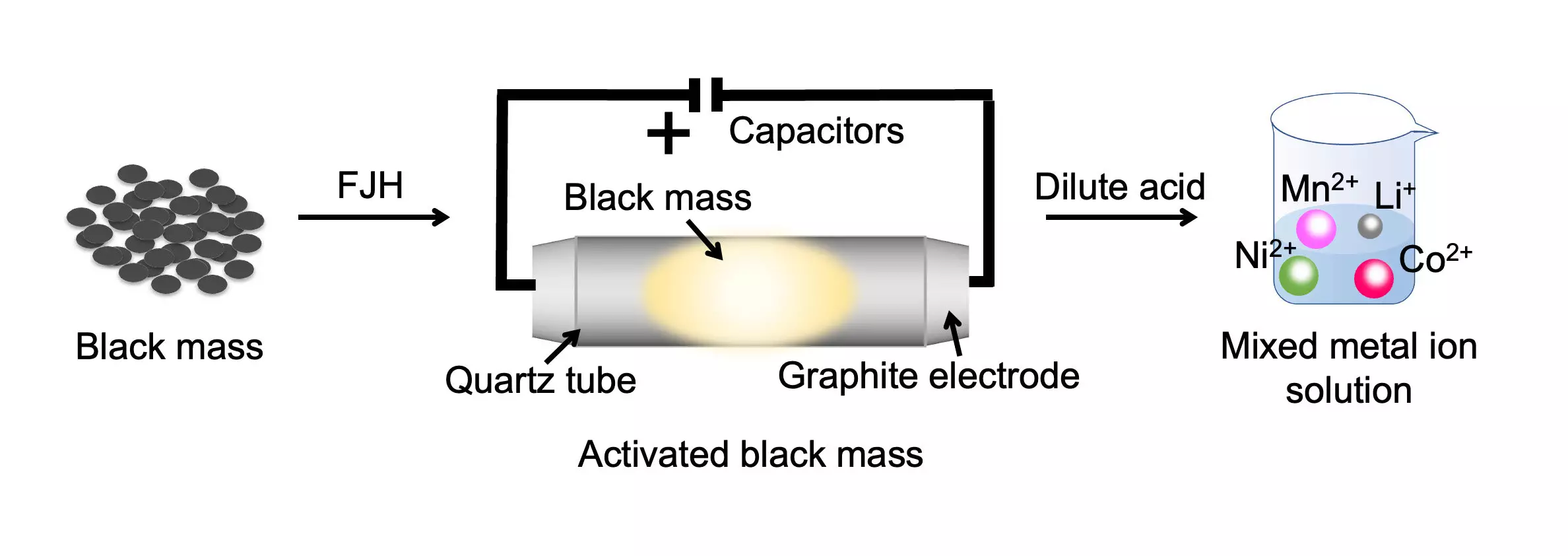The demand for valuable metals needed in batteries is set to soar in the coming decades in tandem with the growth of clean energy technologies. As the world increasingly relies on renewable energy sources and electric vehicles, the need for efficient battery recycling methods becomes crucial. Researchers at Rice University have developed a groundbreaking battery recycling process that could revolutionize the industry.
A Breakthrough in Metal Recovery
The battery recycling process developed by Rice University scientists tackles one of the biggest challenges in battery recycling: the inert layer on battery metals. By utilizing the signature Joule-heating technique, the researchers were able to remove this layer and lower the oxidation state of the metals. This breakthrough makes the metals soluble in low-concentration acid, allowing for efficient extraction.
Exceptional Metal Recovery Yield
The Rice chemist James Tour and his team achieved an impressive metal recovery yield of over 98% from various types of mixed battery waste. Their high-yield, low-cost method significantly reduces the environmental footprint of the traditional recycling process. Moreover, it slashes the duration of the recycling process by almost 100-fold. Instead of taking 24 hours, the new method dissolves the same amounts in less than 20 minutes.
Reducing Environmental Impact
One of the notable benefits of this innovative recycling process is the reduced secondary waste streams from the acidic leaching solutions. By decomposing the passivated layer and regulating the metal valence state, the process improves the metals’ leaching kinetics. This not only enhances the efficiency of metal extraction but also minimizes the environmental harm caused by traditional recycling methods.
The Potential for a Market Transformation
The battery recycling industry is poised for exponential growth as the batteries powering electric vehicles and other electronics reach their end of life. With its ability to recover metals with exceptional yield and efficiency, this new process has the potential to transform the market. By making battery recycling more economically viable, it could facilitate the mass production of electrical vehicles and contribute to a more sustainable future.
In addition to its environmental benefits, recycling spent batteries is a financially sound practice. The concentration of valuable metals like cobalt and nickel is often higher in lithium-ion batteries than in natural ores. Currently, around 95% of batteries are not recycled due to a lack of recycling capacity. However, as electronic waste continues to increase at an annual rate of 9%, the need for efficient recycling methods becomes increasingly urgent.
A Cleaner and More Efficient Recycling Process
Traditional battery recycling processes rely on strong acids, making them messy and cumbersome. In contrast, this new process developed by Rice University uses a flash technique to separate out critical metals using low-concentration hydrochloric acid. While acid is still used, it is significantly reduced, resulting in an economically and environmentally superior method. The flash liberates the metals, making them dissolve more easily and reducing the overall cost of the recycling process.
The implications of this breakthrough battery recycling process are far-reaching. It not only addresses the pressing need for sustainable and efficient recycling methods but also contributes to the advancement of clean energy technologies. By reducing the cost and environmental impact of battery waste recycling, it paves the way for a more sustainable future. This study’s life-cycle assessment highlights the potential to spur the growth of battery waste management and drive down the cost of battery production, making electric vehicles and other clean energy technologies more accessible to all.
The future of battery recycling looks bright. With the use of innovative techniques like the one developed by Rice University scientists, we can overcome the challenges associated with battery waste and pave the way for a cleaner and more sustainable future. By prioritizing efficient recycling processes, we can ensure the responsible use of our valuable resources and contribute to the growth of clean energy technologies.


Leave a Reply